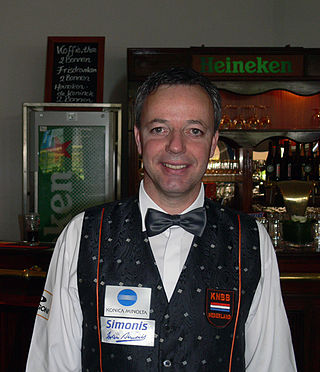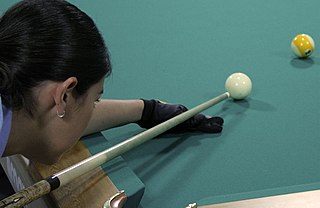Five-pins, fivepins, or 5-pins may refer to:
- Five-pin billiards, including:
- Five-pin bowling
Five-pins, fivepins, or 5-pins may refer to:

Cue sports are a wide variety of games of skill played with a cue, which is used to strike billiard balls and thereby cause them to move around a cloth-covered table bounded by elastic bumpers known as cushions.

Bagatelle is a billiards-derived indoor table game, the object of which is to get a number of balls past wooden pins into holes that are guarded by wooden pegs; penalties are incurred if the pegs are knocked over. It probably developed from the table made with raised sides for trou madame, which was also played with ivory balls and continued to be popular into the later 19th century, after which it developed into bar billiards, with influences from the French/Belgian game billard russe. A bagatelle variant using fixed metal pins, billard japonais, eventually led to the development of pachinko and pinball.

Pool is a classification of cue sports played on a table with six pockets along the rails, into which balls are shot. Each specific pool game has its own name; some of the better-known include eight-ball, blackball, nine-ball, ten-ball, seven-ball, straight pool, one-pocket, and bank pool. Eight-ball is the most frequently played discipline of pool, and is often thought of as synonymous with "pool".
The following is a glossary of traditional English-language terms used in the three overarching cue sports disciplines: carom billiards referring to the various carom games played on a billiard table without pockets; pool, which denotes a host of games played on a table with six pockets; and snooker, played on a large pocket table, and which has a sport culture unto itself distinct from pool. There are also games such as English billiards that include aspects of multiple disciplines.
Billiard or billiards may refer to:

Dingeman Jacobus Johannes "Dick" Jaspers is a Dutch professional carom billiards player who specializes in the three-cushion event.

Five-pin billiards or simply five-pins or 5-pins, is today usually a carom billiards form of cue sport, though sometimes still played on a pocket table. In addition to the customary three balls of most carom games, it makes use of a set of five upright pins (skittles) arranged in a "+" pattern at the center of the table. The game is popular especially in Italy and Argentina, but also in some other parts of Latin America and Europe, with international, televised professional tournaments. It is sometimes referred to as Italian five-pins or Italian billiards, or as italiana. A variant of the game, goriziana or nine-pins, adds additional skittles to the formation. A related pocket game, with larger pins, is played in Scandinavia and is referred to in English as Danish pin billiards, with a Swedish variant that has some rules more similar to the Italian game.

The Union Mondiale de Billard is the world governing body for carom (carambole) billiard games.
Carom billiards and pool are two types of cue sports or billiards-family games, which as a general class are played with a stick called a cue which is used to strike billiard balls, moving them around a cloth-covered billiard table bounded by rubber cushions attached to the confining rails of the table.

Ground billiards is a modern term for a family of medieval European lawn games, the original names of which are mostly unknown, played with a long-handled mallet, wooden balls, a hoop, and an upright skittle or pin. The game, which cue-sports historians have called "the original game of billiards", developed into a variety of modern outdoor and indoor games and sports such as croquet, pool, snooker, and carom billiards. Its relationship to games played on larger fields, such as hockey, golf, and bat-and-ball games, is more speculative. As a broader classification, the term is sometimes applied to games dating back to classical antiquity that are attested via difficult-to-interpret ancient artworks and rare surviving gaming artifacts.

Boccette is a billiards-type game played in Italy. A variation of the game of five-pins, it is played on a pocketless (carom) billiard table with nine balls. Cue sticks are not used; the balls are manipulated with the hands directly. The Game is very popular in countries colonized by Italy, specially in Eritrea

Goriziana or nine-pin billiards is a carom billiards game, especially popular in Italy.

Danish billiards or keglebillard, sometimes called Danish five-pin billiards, is the traditional cue sport of Denmark, and the game remains predominantly played in that country. It makes use of a 5 × 10 ft six-pocket table, three billiard balls, and five pins, which are considerably larger than those used in the similar and internationally standardized game of five-pin billiards.
Nine-pins, ninepins, or 9-pins may refer to:
Pin billiards may refer to any of a fairly large number of billiard games that uses a pin, or a set of "pins" or "skittles". The earliest form of billiards, ground billiards, was played with a single pin called the "king". Table billiards kept the king until the mid-18th century. There are billiard games played with as many as thirteen pins.
Italian billiards may refer to:

A cue stick is an item of sporting equipment essential to the games of pool, snooker and carom billiards. It is used to strike a ball, usually the cue ball. Cues are tapered sticks, typically about 57–59 inches long and usually between 16 and 21 ounces (450–600 g), with professionals gravitating toward a 19-ounce (540 g) average. Cues for carom tend toward the shorter range, though cue length is primarily a factor of player height and arm length. Most cues are made of wood, but occasionally the wood is covered or bonded with other materials including graphite, carbon fiber or fiberglass. An obsolete term for a cue, used from the 16th to early 19th centuries, is billiard stick.
Bye Bye Baby is a 1988 Italian romantic comedy film directed by Enrico Oldoini. The film starred Brigitte Nielsen and Carol Alt. It is one of the few films to feature five-pin billiards on-screen in any detail.